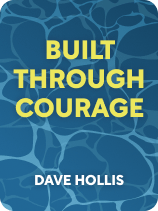

This article is an excerpt from the Shortform book guide to "Built Through Courage" by Dave Hollis. Shortform has the world's best summaries and analyses of books you should be reading.
Like this article? Sign up for a free trial here.
Do you want to become a better version of yourself? What’s the number one way to make necessary changes in life?
Change is possible, but only if you believe it is. Otherwise, you’ll never grow beyond the circumstances you’re living in. Luckily, Built Through Courage by Dave Hollis has tips to help you believe in change.
Continue reading for tips on changing your current circumstances.
Believe You Can Change Your Circumstances
Many people don’t fulfill their purpose because they don’t recognize their own potential for change. Thus, an important step to changing your life and fulfilling your purpose is to believe in change.
(Shortform note: In The Magic of Thinking Big, David J. Schwartz further explains why it’s essential to believe that change is possible: If you believe you can’t do something, you’ll subconsciously search for confirmation of this belief. He notes that you can even subconsciously confirm it yourself by working less hard or less carefully. In contrast, if you do believe in yourself, you’ll search for confirmation of your abilities, which can make you subconsciously work harder or more carefully.)
Hollis offers a few tips for cultivating the belief that you can change your circumstances:
Tip #1: Use Imagination
Imagination is an important tool for believing change is possible. It lets you picture different opportunities and paths forward rather than simply accepting your current path. In turn, realizing you can make those potential lives a reality encourages you to change.
For instance, Hollis had the opportunity to leave Disney and help his then-wife run her self-help and lifestyle company—a change that aligned well with his purpose of helping others and his goal to be more present for his family. After working at Disney for so many years, though, he struggled to even consider this new path. It seemed illogical to leave a well-paying, respected job that guaranteed a steady future. However, by letting himself imagine what his life would look like if he left, Hollis realized how much happier and more fulfilling that alternative path would be. That encouraged him to depart Disney to pursue his purpose.
(Shortform note: Some psychologists add that imagining many alternative scenarios is better than imagining one. Having varied options can help you make better-informed decisions about the changes you want to make and how to make them. If you only imagine one scenario, you risk choosing that path simply because it’s there, much like mindlessly accepting your current path. The more options you consider, the lower this risk is, as comparing several options forces you to carefully consider which path would make you happiest and most fulfilled. This may not always be necessary, though, as Hollis only mentions imagining one scenario—helping his wife run her self-help and lifestyle company—and he was still happy with his decision to leave Disney.)
To start this process, imagine dying without any regrets, Hollis says. What would your life look like? What would you have done? Imagining the happiness and fulfillment of a life without regrets provides a big-picture idea of how you want to live and gives you the courage to make changes in the present so you can realize your imagined scenario.
(Shortform note: While Hollis recommends focusing on your future, some psychology experts instead suggest reflecting on your past—specifically, past regrets. Considering why you regret those situations reveals your values and which behaviors violate them. Knowing this can help you change your future behavior to honor your values and avoid repeating mistakes.)
Tip #2: Challenge Restrictive Beliefs
Challenging your restrictive beliefs is another important part of believing that change is possible. Restrictive beliefs are negative things you believe about yourself that stop you from changing or achieving your purpose. They usually stem from your upbringing, the roles that affect your sense of identity, and your past experiences. These are the main elements that influence your behavior and sense of self, Hollis says, which in turn affect your decisions.
For example, if you were frequently left in charge of your younger siblings growing up, you might develop the restrictive belief that you have to be responsible for other people and that your role is the “caretaker.” This belief stops you from pursuing your own interests and goals since you’re focused on looking after others. If you want to achieve your purpose and feel happy and fulfilled, you must challenge your restrictive belief and give yourself permission to focus on yourself instead of (or in addition to) focusing on other people.
(Shortform note: In Awaken the Giant Within, Tony Robbins says that particularly complex experiences are most likely to dictate your restrictive beliefs. Your brain simplifies and generalizes these experiences, losing nuance and resulting in a false or restrictive negative belief. Continuing our example, you did have to be responsible when you were supervising your siblings, but that doesn’t mean you always have to be responsible for others to the detriment of your goal. Generalizing your responsibility—taking your role of caretaker for your siblings and applying it to more people—turns a truth into a restrictive belief.)
To overcome your restrictive beliefs, analyze where they came from, Hollis suggests. Often, these beliefs stem from untrustworthy sources—people who don’t understand or support your values and goals and instead try to impose their own values and goals on you. Recognizing that these sources are untrustworthy makes it easier to dismiss restrictive beliefs.
For example, you may have the restrictive belief that becoming a teacher is a boring, low-status, poorly paid career path. If you analyze the source of this belief, you can realize that it stems from your parents, who value high-paying, competitive business careers. This doesn’t align with your own ideals of pursuing your passion, helping others, and sharing knowledge, making your parents an untrustworthy source.
(Shortform note: Hollis’s recommendation here is arguably a form of Socratic questioning: asking yourself questions about your beliefs to dig into their possible roots and validity (or lack thereof). As well as asking where the belief came from, you might ask what proof there is (or isn’t) to support the belief, whether it’s based on rational evidence or pure emotion, what assumptions support the belief, and how those assumptions might be flawed. Your answers may reveal that the belief is false, built on faulty assumptions, and purely restrictive, making it easier to dismiss.)
Tip #3: Change Your Perspective
Changing your perspective can also help you believe that you can change your life and achieve your purpose. Hollis says your experiences shape you: The type of significance you put on an experience affects your behavior and sense of self. If you put positive significance on experiences—viewing them as a source of strength or motivation, for instance—you’re more likely to grow as a person and achieve your purpose. This is in contrast to putting negative significance on experiences—for example, viewing them as a source of weakness or pain—which defines you by those events and makes it difficult to move past them.
To focus on the positives of past situations, consider how they helped you grow, rather than focusing on how they hurt you, Hollis says. This shift in focus can help you feel empowered to grow and change, instead of trapped by your experiences.
For example, if you get fired from a job and focus on feeling angry, embarrassed, and inadequate, you’ll keep feeling those emotions every time you think about working, which will discourage you from applying to other jobs. If you instead focus on the lessons you learned—for example, you’re not suited to an office job—you’ll feel empowered to use that knowledge to find a job that suits you better, allowing you to move on from losing the first job.
| Stoicism and Changing Your Perspective Hollis’s philosophy on changing your perspective is arguably an example of Stoicism, an ancient Greek philosophy. According to Ryan Holiday in The Obstacle Is the Way, Stoics believe that no event is good or bad, and it’s the way we interpret these events that determine whether they have a positive or negative effect on our lives. Stoics also believe you can choose to find a positive side of any event, which lets you interpret the event positively. Thus, a large part of Stoic philosophy involves changing your perspective, as Hollis recommends. While Hollis discusses changing your perspective on past experiences, Holiday notes that viewing present situations positively can also empower you: You’re more likely to persevere through a difficult situation when you see it as an opportunity rather than a problem you can’t solve. You feel more empowered because you’re focusing on your ability to bring a positive opportunity out of a negative situation. In turn, this belief in your ability helps you move past the negative situation and grow as a person. |

———End of Preview———
Like what you just read? Read the rest of the world's best book summary and analysis of Dave Hollis's "Built Through Courage" at Shortform.
Here's what you'll find in our full Built Through Courage summary:
- Why the key to a fulfilled life is achieving your unique purpose
- How to identify and achieve the role you're meant to fill
- How to overcome the two barriers to reaching your potential






